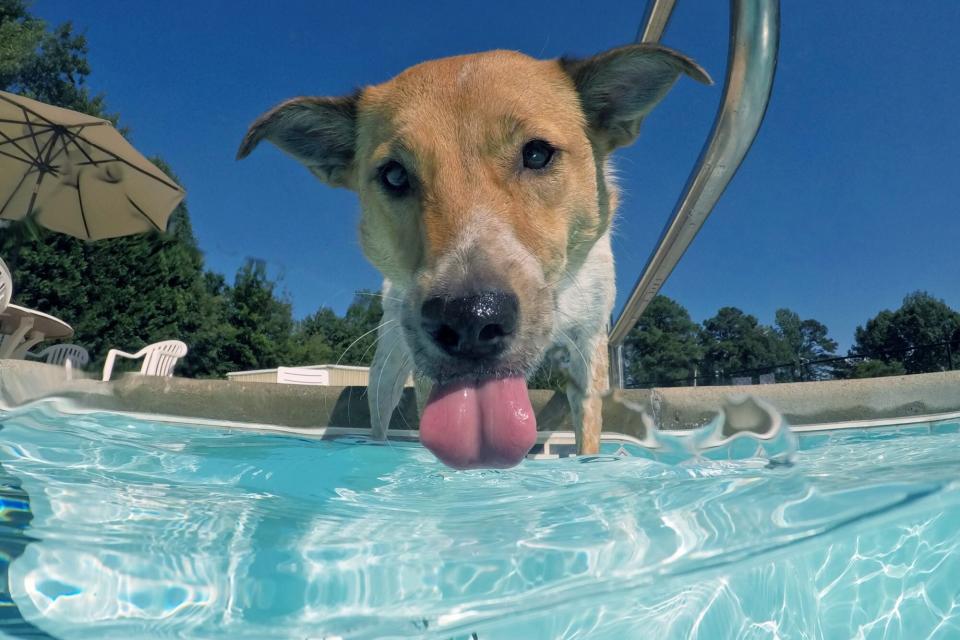Is Your Dog Drinking Pool Water? Here's When It's OK and When You Should Step In

NATASHA SIOSS / Getty
For many of us, summertime means swimming and poolside lounging in the sun. If you're lucky enough to have access to a private pool, you may even want to bring your dog along. Many dogs love swimming and playing in water. But what happens if your dog is drinking pool water?
Can Dogs Drink Pool Water?
Without even realizing it, everyone ingests a little water while swimming. If the pool is well-maintained and chemically balanced, it's considered generally safe for both people and dogs to inadvertently swallow small amounts of pool water while swimming. However, it's not a good idea to deliberately drink lots of pool water—pool chemicals and other toxins in the water may be harmful to dogs.
Unfortunately, many dogs will lap up extra amounts of pool water when they get thirsty or accidentally swallow gulps of water while playing. This can cause a few different problems.
Chlorine Pools
Ingesting too much chlorine can cause irritation to the mouth, esophagus, and stomach. This is more likely to happen if your dog gets into chlorine tablets or concentrates. The Centers for Disease Control and Prevention state that it's safe for pets and people to drink water with chlorine levels up to 4 milligrams per liter, and most chlorine pools are around 1-3 milligrams per liter. In theory, it sounds safe—but that's not all you find in pool water. The chlorine in pools gradually turns into chemicals called chloramines, and this is what you're really smelling when you think you smell chlorine. Chloramines can irritate skin, eyes, and mucus membranes.
Saltwater Pools
Saltwater pools still contain small amounts of chlorine, so drinking lots of this water can have similar effects as chlorine pools. In addition, the salt content can cause diarrhea, vomiting, dehydration, and electrolyte imbalances. This is a bigger issue in the ocean and less of a concern with saltwater pools, which have about one-tenth the salt content as the ocean. Still, large amounts of salty pool water can cause problems.
Imbalanced Pool Water
It's clear that too many chemicals in pool water can harm dogs, but too few chemicals can be just as bad. All kinds of microscopic materials get into pool water, whether they're from people, other animals, pool accessories, and even the environment. Filtration and chemical balance must be constantly maintained to ensure the water is safe for everyone. Under-treated pool water may contain bacteria, algae, parasites, and other pollutants that can make dogs sick. Be sure to check the pH of your pool regularly and do chemical shock treatments as needed. Always keep your dog away from the pool until the chemical balance is safe again.
Water Intoxication
Water intoxication is a rare complication that occurs when dogs (or people) drink excessive amounts of water. The ASPCA Animal Poison Control Center says that initial signs of water intoxication may include nausea, vomiting, lethargy, and enlarged abdomen. In more severe cases, dogs may experience weakness, drunken gait, coma, seizures, hypothermia, and low heart rate.
You can prevent excessive pool water ingestion by supervising your dog while swimming. Be sure to provide plenty of fresh, cool water near the pool. Direct your dog to the fresh water if they drink from the pool. If your dog is drinking extreme amounts on a hot day, it's best to bring them inside to cool down. This can prevent overconsumption of water as well as heat exhaustion and heatstroke.
RELATED: Incredibly Brave Hero Dog Rescues Smaller Pup From Drowning In Swimming Pool
Can Dogs Swim in Chlorine Pools? What About Saltwater Pools?
It's generally safe for dogs to swim in both chlorine and saltwater pools as long as the chemicals are balanced. Of course, it's important to make sure your dog knows how to swim. Regardless of their swimming skills, be sure to supervise your dog at all times.
Also, pool water may dry out your dog's skin and coat. You can prevent this by rinsing or bathing your dog after swimming. Avoid giving a bath right before swimming because it strips the natural protective oils on your dog's skin and can make pool water more irritating. If you don't have access to a dog-friendly pool but still want to give your pup a refreshing spot to take a dip, try purchasing their own doggie pool or even sprinkler.
What to Do If Your Dog Drank Pool Water
There's no need to panic if your dog drinks a little bit of pool water. Just put a stop to it and make sure to provide fresh water nearby. Watch your dog for any signs of illness and call your veterinarian if you're not sure.
It's best to contact your vet for advice if your dog drinks a large amount of pool water. They may tell you it's safe to watch and see if your dog develops any issues. Or, they may tell you to come in for an exam. If your dog is acting very lethargic or sick after swimming, then you should get your dog to the nearest open vet just to be safe, even if it means a trip to the emergency vet.
